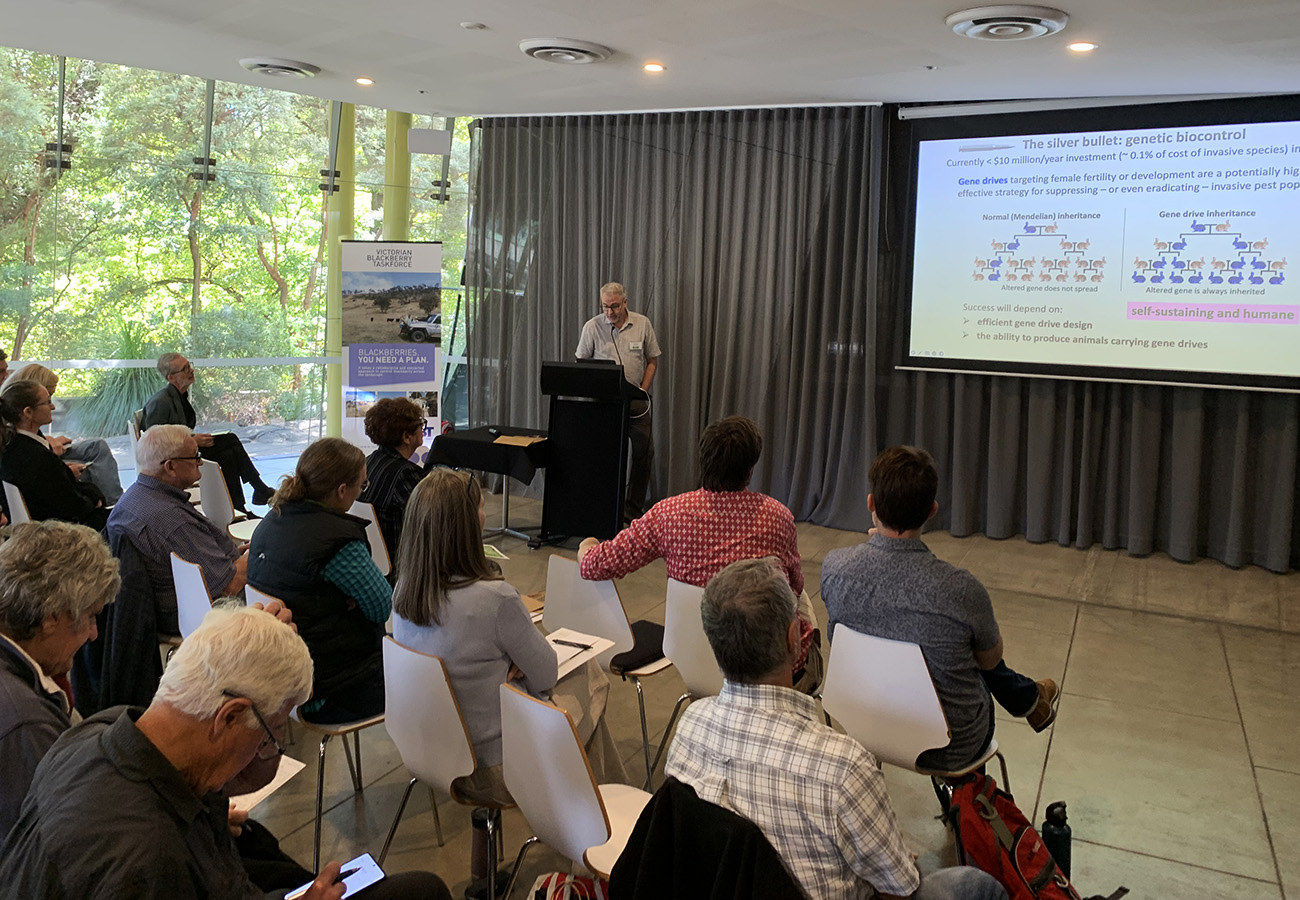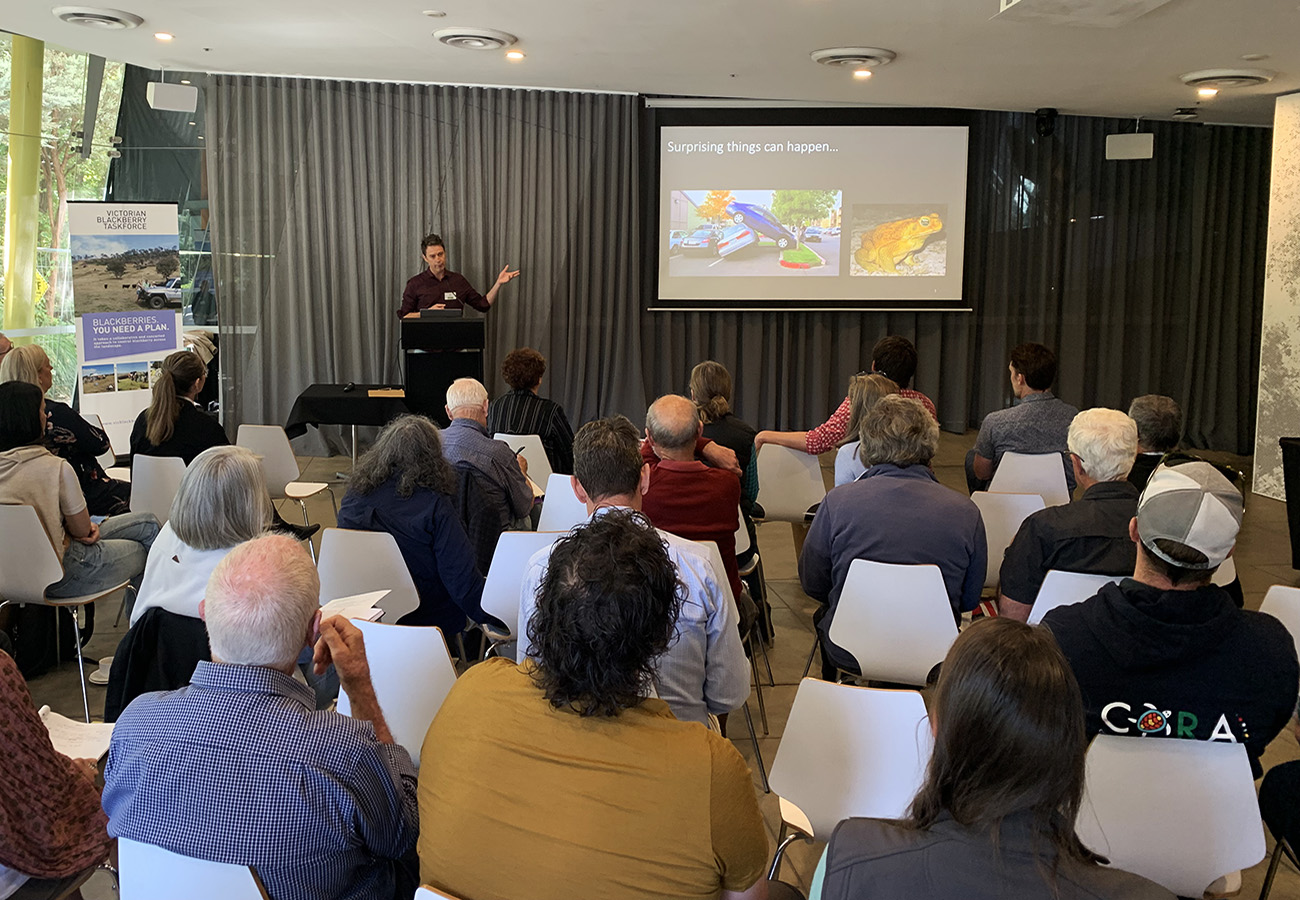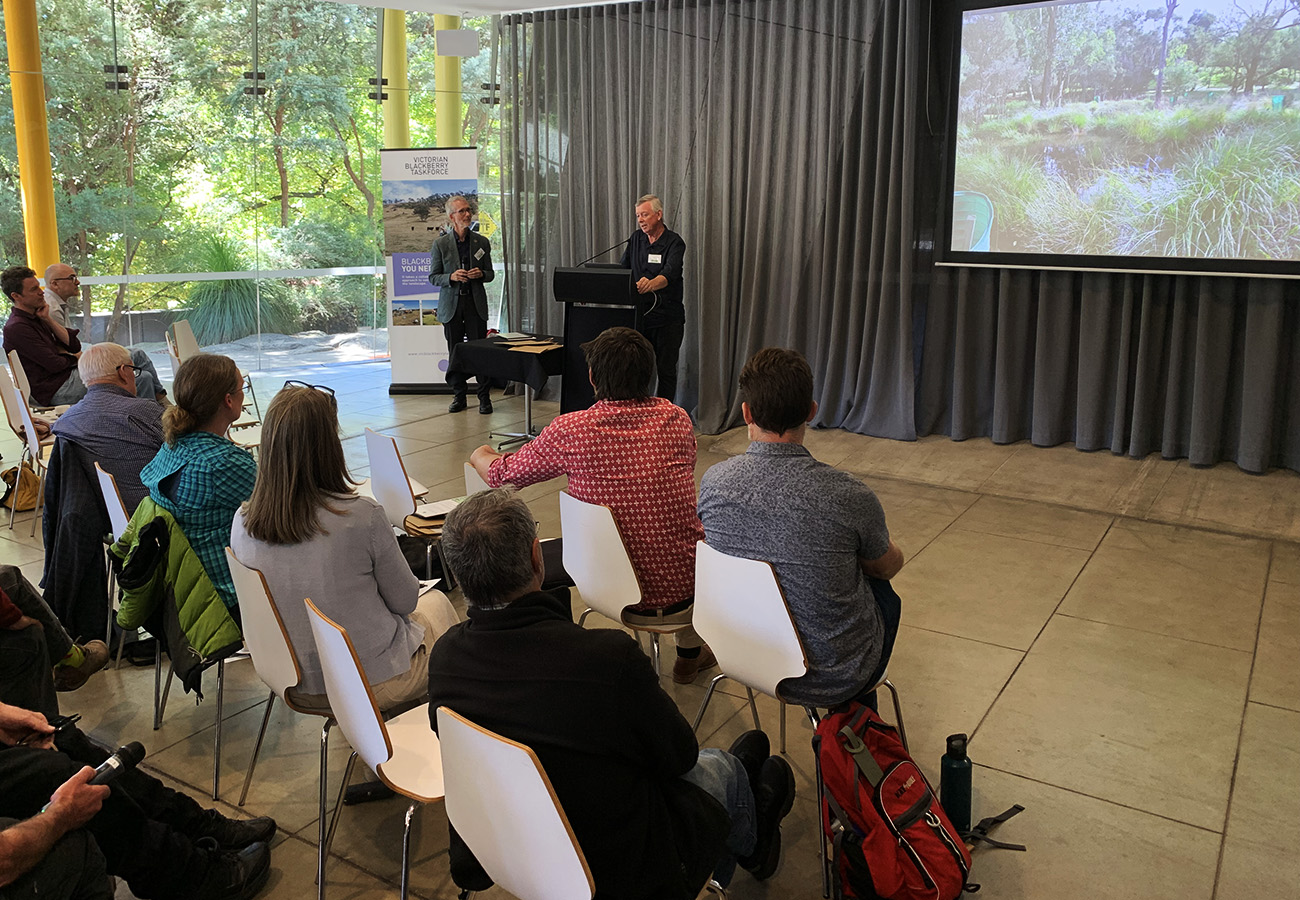
Science & Community.
FUTURE OPPORTUNITIES
AND CHALLENGES IN INVASIVE
SPECIES MANAGEMENT
BRINGING SCIENCE
AND COMMUNITY
TOGETHER
Established Invasive plants and animals cause many headaches for landholders, not only for loss in productivity and environmental values, but the shear effort to control them. Baiting, ripping, fumigation, shooting, trapping, spraying, mulching and slashing are all duties land managers undertake regularly to keep on top of their problem. Due to their widespread nature, eradication is out of the question.
Are there opportunities for the development of additional management tools for invasive pests and what are the challenges to making them a reality?
On the 15 March, 60 community delegates engaged with leading scientists at the Future Opportunities and Challenges in Invasive Species Management event, at the Melbourne Museum.
Chaired by Professor Tim Entwisle – author, botanist, former botanic gardens director, the forum focused on the latest research into biological control, gene drive technology, using genetic information to forecast potential distribution and pathogens as tools to reduce the impacts of invasive pest plants and animals.
Professor Euan Ritchie – Deakin University set the scene by outlining how invasive pests in Australia are one of the major reasons for species extinctions. He was also keen to point out that removing invasive species from the environment doesn’t necessarily mean everything is positive! There could be negatives including an increase in other pest species.
Shalan Schofield – Department of Agriculture, Fisheries and Forestry outlined Australia’s three-tiered biosecurity system and the importance of citizen science in protecting Australia’s economy and environment.
Dr Annelise Weibkin – Department of Primary Industries South Australia defined the threat that deer poses on the environment and the economy, and how deer could be the next rabbit. Since the impacts of deer are increasing and their status in Victoria is a game animal not an invasive, fewer solutions are available.
The next round of speakers focused on scientific solutions.
Dr Alex Fournier-Level – University of Melbourne, described the use of genetic information to predict the invasion of Common ragweed (Ambrosia artemisiifolia), which has not yet established in Australia. Common Ragweed has genetic variation across different regions in the Northern Hemisphere which affects the invasive nature of the plant. This research will assist in predicting the spread and helping with management actions.
Dr Stephen Frankenberg – University of Melbourne, outlined how ‘gene drive’ technology could be used to combat invasive animals by targeting female fertility.
Professor Ben Phillips – Curtin University followed up and explained some of the social and technical challenges in developing ‘gene drive technology’ including funding and social licence.
Greg Lefoe – Senior Researcher, Agriculture Victoria summarised the current biocontrol’s for blackberry, gorse and serrated tussock and future research opportunities for these pests.
Colin Arnold – GrazeAway, illustrated how goats can be a proven standalone measure if managed properly. In the right circumstances goats will target weed species and leave natives alone. Colin acknowledged the irony of goats being used as a tool to control invasives.
The Victorian Blackberry Taskforce is keen to continue advocating and supporting invasive species research for public benefit. We need to ensure the wider community is aware of what is happening in invasive species research. Information between community and scientific institutions can be facilitated by groups such as the Victorian Blackberry Taskforce to ensure evidence-based information is provided to interested communities through newsletters, webinars, discussion forums and direct communication to our Mailchimp subscribers.
Presentations from this event are now available to view on the VBT’s YouTube Channel.

Forum session / 1
Video
Session 1 topics & speakers:
INTRODUCTION – Professor Tim Entwisle, Author, botanist and former botanic gardens director.
CONTROVERSIES AND CHALLENGES OF MANAGING INVASIVE SPECIES IN AUSTRALIA – Professor Euan Ritchie, Deakin University
LEARNING FROM RABBITS AND INSTILLING ENVIRONMENTAL BIOSECURITY HABITS – Ms Shalan Scholfield, Department of Agriculture, Fisheries & Forestry
TOOLS TO MANAGE DEER NOW AND INTO THE FUTURE – Dr Annelise Weibkin, National Deer Management Plan Co-ordinator, Department of Primary Industries and Regions SA, Adelaide, SA



Session 1 of 3 sessions
Forum session / 2
Video
Session 2 topics & speakers:
GENETIC BIOCONTROL FOR INVASIVE VERTEBRATE PESTS – Dr Stephen Frankenberg, University of Melbourne
HOW IS GENETIC INFORMATION USED TO PREVENT WEED INVASION RISK? – Dr Alex Fournier-Level, University of Melbourne
CHASING THE GRAIL: THE PROMISE AND CHALLENGES OF GENE DRIVES – Professor Ben Phillips, Curtin University



Session 2 of 3 sessions
Forum session / 3
Video
Session 3 topics & speakers:
BIOLOGICAL CONTROL OF WIDESPREAD WEEDS – RESEARCH TO ACTION – Greg Lefoe, Senior Research Scientist with the Department of Energy, Environment and Climate Action’s Agriculture Victoria Research Division
CONTROLLING WEEDS USING GOATS – Colin Arnold, GrazeAway
SUMMING UP AND Q&A SESSION – Professor Tim Entwisle, Author, botanist and former botanic gardens director
CLOSING REMARKS – Lyn Coulston, Victorian Chairperson



Session 3 of 3 sessions
Contacts
Contact the Victorian Blackberry Taskforce:
Victorian Blackberry Taskforce PO Box 536 Wodonga 3689
vbt@vicblackberrytaskforce.com.au
Stay Updated
Need ideas to get rid of blackberry weed? Subscribe and stay updated with the latest information and news from the Victorian Blackberry Taskforce. Email us with a request to subscribe at: info@vicblackberrytaskforce.com.au